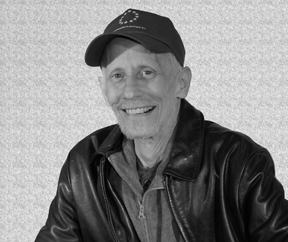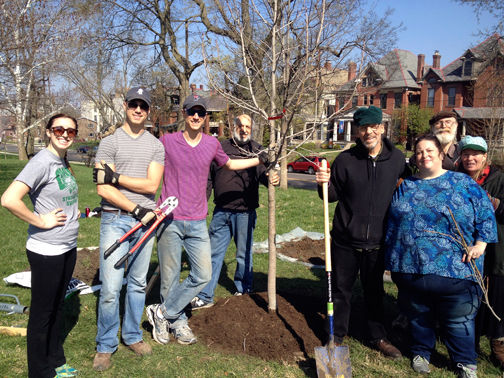
Columbus, Ohio USA
Return to Homepage www.shortnorth.com
Monkeys Retreat Co-Owner Stanley Bobrof (1942-2014)
Beloved beatnik was trailblazer and consummate conversationalist
By Margaret Marten
May/June 2014 Issue
Return to Homepage
Return to Features Index
Stanley Bobrof in 2007 Photo © Rick Borgia Stanley Bobrof, co-owner of Monkeys Retreat, the iconic beatnik store selling alternative literature and other sixties stuff in the University District and Short North for more than 30 years, passed away on February 12, 2014, from emphysema. He was 72.
Bobrof was born in Akron, Ohio, the son of Dorothy and Leroy Bobrof. The family, including his sister Jeri, lived in Canton until 1956, then moved to Columbus where Bobrof attended Eastmoor High School until his graduation in 1960. He later studied at the Ohio State University and University of Cincinnati where he graduated in psychology. His first job out of college was as a counselor at the Ohio State Reformatory in Mansfield.
Monkeys Retreat, located at 1202 N. High St. when it closed in 2010, was owned by Bobrof and two local musicians, Darryl and Ro-z Mendelson. The store remained in business for over 30 years, first in the University District at 2400 N. High St. and later in the Short North. There were a number of precursors to that business which the brothers and Bobrof and their friend Allen Ross operated beginning in the late ‘60s and ‘70s that made their mark (and waves) on the Columbus community: Charlie’s Guitar, Postively Fourth Street, and Absolutely Positively Fourth Street were trendsetters for musicians, counterculture consumers and spiritual seekers.
Charlie Einhorn, who met Bobrof in High School and remained a lifelong friend, said the two loved to travel and went on road trips together and that New York City was a favorite destination. They worked as cab drivers there for six months in the early ‘70s. The city would become Bobrof’s home again a few years later when he and Darryl Mendelson opened SohoZat in Manhattan in 1978, described as the “hippest store in the history of the world,” selling publications, newspapers and comix no one else had, attracting the likes of Art Spiegelman and other local celebrities. “Although having Monkeys Retreat was great,” said Ro-z, “Stan wanted more. He wanted to be in New York where his big ideas could meet the big city.” Skyrocketing rent, however, forced Bobrof and Mendelson out after 14 years, in 1992, the year they returned to Columbus and to Monkeys Retreat.
A colorful example of Bobrof’s early wanderlust occurred in 1970 when, inspired by a trip to the Woodstock Festival the previous summer, he purchased three school buses with money from a small inheritance and began traveling around the eastern United States in the buses to music festivals with the Mendelson brothers, Charlie Einhorn and Candy Watkins. One of the highlights was spending a month at the 2nd Atlanta International Pop Festival before heading cross country to California and Oregon where they met Ken Kesey and stayed at a commune of former Merry Pranksters for a few days before returning at the end of the summer.
(LtoR) Meg Boley, Rodrigo Iglesias, Mike Parker, Ro-z Mendelson, Darryl Mendelson, Lisa Levy, Bill Finzell, and Robbi Palmer at a tree planting in Goodale Park to memorialize Stanley Bobrof. Longtime friend Alan Fliegel describes Bobrof as a trailblazer. Charlie’s Guitar, Bobrof’s first business venture at E. 13th and High streets, selling hippie apparel and alternative publications, was a sensation. Bobrof claimed it was the first store in Columbus to sell bell-bottoms. Einhorn describes it as “the right store at the right time in the right place.” Positively Fourth Street, which operated in the early ‘70s for two years before transitioning into Absolutely Positively Fourth Street, was one of Columbus’s first community bars. And SohoZat in the Big Apple couldn’t have been a more vivid testimony to Bobrof’s trailblazing talent, glorifying free expression, adventure and just plain fun. Yet, it was Monkeys Retreat that ultimately became his home, his literary “retreat,” where he would work, argue and laugh for the next 18 years after SohoZat’s closing.
“He sat there behind the counter and he loved it,” said Einhorn. “His thing was people, meeting people, talking to people. He could be provocative because he was very direct and didn’t put up with nonsense.” He loved knowledge, said his niece Lisa Levy. “He was into so many things. He loved reading, and he loved to argue just to learn.” Writing was a pasttime, and Bobrof put it into practice by publishing a magazine in New York – one issue of Wave and five issues of Zat. He also contibuted to Einhorn’s Innerart Bits blog reviewing publications from Monkeys Retreat.
“One of my favorite things was to hear Stanley and Charlie talking – philosophers and historians,” said Fliegel. “I got my doctorate, but they always turned me on. It was just so cool to be around them.” Einhorn says he relied on Bobrof to validate viewpoints and would routinely ask himself what Stanley might think about one thing or other. “He and I used to talk a lot, exchange ideas,” he said. “People would think we were fighting or we were having an argument. No, we were just talking, just exchanging ideas. We agreed that it’s okay to disagree.”
An intense interest in books and magazines is something Bobrof brought back to Columbus from New York, according to Watkins. “Monkeys Retreat used to be kind of a collective, a cooperative, and then when Stanley came back, he turned it into the newsstand – books, literature, and that kind of thing.” And that type of atmostphere could easily generate conversation with customers, which he loved.
Bobrof called Monkeys Retreat a space age variety store, and he called himself a beatnik, not a hippie, and made sure you knew the difference. “It was a really important distinction for him,” said Einhorn, “because hippies require no intellectual investment. Anybody could be a hippie. You just have to love flowers and music or whatever.” But you couldn’t just call yourself a beatnik. “You had to know poetry and Indian philosophy, and you had to know about jazz, and you had to know about obscure French poets. You had to have lived.”
“Uncle Stan was the kind of person who no matter how much you know about him it would never ever summarize the person he was,” said his niece, and in spite of his wanderlust ways, he was a family man at heart, attending to the needs of his immediate family and close circle of friends. “He was like the patriarch,” explained Ro-z.
“He had times when he would leave and go on adventures,” Watkins said, “but he always seemed to come back home. His home was here, and that was a good thing because we loved him and wanted him home.”
© 2014 Short North Gazette, Columbus, Ohio. All rights reserved.
Return to Homepage www.shortnorth.com

